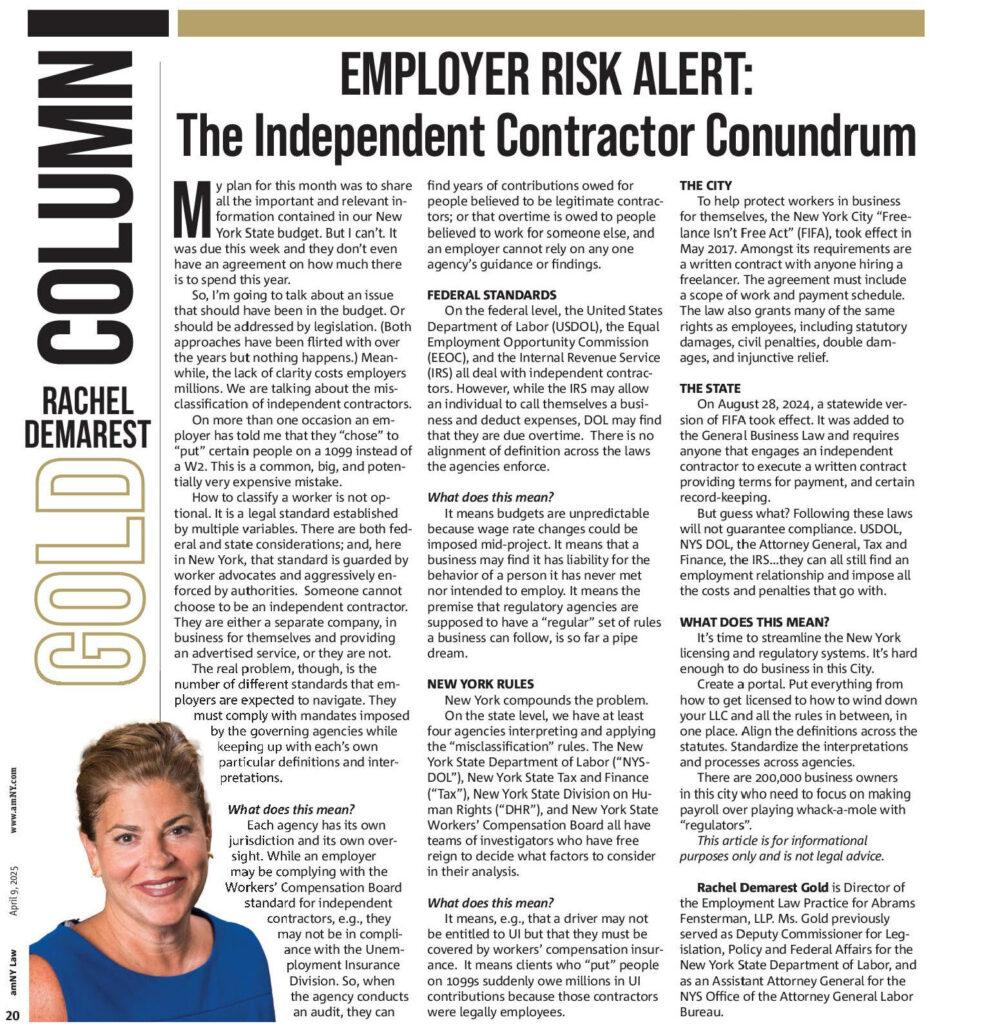On April 25, 2012, by a 4:1 vote, the federal Equal Employment Opportunity Commission (“EEOC”) issued a policy guidance warning employers about using arrests or criminal convictions to make decisions about employees. Typically, employers request record checks of candidates for employment, and then make decisions based on the result. In addition, employers may be forced into making decisions when an existing employee is arrested or convicted.
Employers are faced with the question of whether they can consider the arrest or conviction in making the employment decision. The EEOC’s guidance provides an opportunity to revisit the rules that govern whether an employer may consider an arrest or criminal conviction in deciding whether to hire or retain an employee.
In the Policy Guidance, the EEOC reiterated its position that an employer’s use of an individual’s criminal history in making an employment decision may violate the federal prohibition against discrimination based on race or national origin. This is because certain races and nationalities have a statistically higher rate of arrests or convictions.
The EEOC’s policy guidance also states that the federal prohibition preempts any less restrictive State law. The policy guidance will require significant changes in those states that do not have any rules governing how to handle employee arrests or convictions.
New York has long had rules addressing when employers may consider convictions and the impact of consideration of an arrest.
Dealing with arrests, the New York State Division of Human Rights has taken the position that it is always unlawful to inquire about an employee’s arrest record, even after a person has been hired. Both New York and the EEOC agree that making any decision based on an arrest itself is unlawful. This is because the fact of an arrest is irrelevant to the employee or applicant’s character, since an individual is innocent until proven guilty.
This prohibition does not mean that an employer must ignore conduct underlying an arrest. The fact of an arrest does not establish that criminal conduct has occurred, and an exclusion based on an arrest, in itself, is not job related and consistent with business necessity. However, an employer may make an employment decision based on the conduct underlying an arrest if the conduct makes the individual unfit for the position in question.
One example used by the EEOC in its guidance is of a Latino assistant principal accused of inappropriately touching young children. The school has a policy requiring suspension or termination of any employee who the school believes engaged in conduct that impacts the health and safety of its students. After investigating the situation and providing the assistant principal an opportunity to explain his conduct, the school terminates him. The EEOC concluded that no discrimination occurred, because the school’s policy is linked to conduct relevant to the particular job at issue and the decision was made based on the underlying conduct, not on the fact of the arrest.
New York’s Human Rights Law also protects against inquiries in employment applications regarding arrest or criminal accusations not then pending, which were followed by a termination in favor of the individual. Thus, if an employee or applicant was arrested but the charges were later dismissed, those accusations cannot be considered by an employer.
The rules are different with respect to convictions. According to both the EEOC and New York State, any blanket bar to employment of all persons with records of conviction is unlawful. As noted above, the EEOC believes that a blanket ban upon hiring employees with criminal convictions might have an adverse impact on particular racial or ethnic groups in certain geographic areas In its policy guidance entitled “Enforcement Guidance on the Consideration of Arrest and Conviction Records in Employment Decisions Under Title VII of the Civil Rights Act of 1964, 42 USC §2000e et seq.”, the EEOC suggests that employers can protect themselves against a discrimination finding either by validating the criminal conduct in accord with the Uniform Guidelines on Employee Selection Procedure or by developing a targeted screening procedure considering at least the nature of the crime, the time elapsed and the nature of the job.
The EEOC’s suggested manner of treating a criminal conviction comports with New York’s requirements. It is, therefore, important to know what New York law requires.
New York’s Corrections Law prohibits discrimination based upon criminal convictions that are unrelated to the job duties or safety concerns. New York General Business Law § 380 has been amended to mandate that if a background check is required in relation to employment, the subject must be given a copy of Article 23-A of the Corrections Law governing licensure and employment of persons previously convicted of a crime.
New York Corrections Law, Article 23-A applies to both public employers and private employers with ten or more employees. It lists the factors that a public or private employer or agency must consider when evaluating an applicant’s prior convictions. It reflects the public policy that an applicant may not be denied employment or licensure because of his or her conviction record unless there is a direct relationship between the offense and the job or license sought, or unless hiring or licensure would create an unreasonable risk to property or to public or individual safety. The factors that should be considered include the following:
– The State’s public policy
– The specific job duties and responsibilities
– The bearing of the offense on fitness to perform the job duties
– The offender’s age when the offense occurred
– The seriousness of the offense
– Any information given by the person about rehabilitation and good conduct
– The legitimate interest of the employer in protecting property and safety and
welfare of specific individuals or general public; and
– Any certificate of relief from civil disabilities or certificate of good conduct, which
gives rise to a presumption of rehabilitation in relation to the offense.
Effective November 1, 2007, New York has expanded the prohibition against adverse employment decisions based upon a criminal conviction to include sealed convictions for a violation and youthful offender adjudications. Certain exceptions apply, including an application for employment or membership in a law enforcement agency.
Upon request and within thirty days, the applicant must be given a written statement of the reasons why employment was denied. The provisions of this law do not apply to the licensing activities of governing bodies in relation to the regulation of firearms or an application for employment as a police officer or peace officer.
Thus, if an employer engages in a background check and finds out that an applicant or an employee has a criminal conviction, the employer must nonetheless engage in an analysis of the applicant/employee and the conviction to determine if the hiring or licensure would create an unreasonable risk to property or to public or individual safety. Complying with the New York requirements should insulate an employer from any objections under federal law. However, the employer who fails to comply with New York’s statutes relating to criminal convictions, likely will be violating both New York and federal law, given the new policy guidance.
For more information on this issue, please contact Sharon Stiller, Esq. or your attorney contact at our firm.





